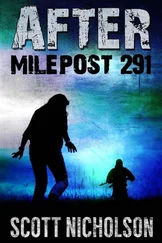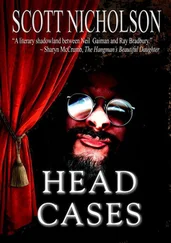Scott Nicholson - Chronic fear
Здесь есть возможность читать онлайн «Scott Nicholson - Chronic fear» весь текст электронной книги совершенно бесплатно (целиком полную версию без сокращений). В некоторых случаях можно слушать аудио, скачать через торрент в формате fb2 и присутствует краткое содержание. Жанр: Триллер, на английском языке. Описание произведения, (предисловие) а так же отзывы посетителей доступны на портале библиотеки ЛибКат.
- Название:Chronic fear
- Автор:
- Жанр:
- Год:неизвестен
- ISBN:нет данных
- Рейтинг книги:3 / 5. Голосов: 1
-
Избранное:Добавить в избранное
- Отзывы:
-
Ваша оценка:
- 60
- 1
- 2
- 3
- 4
- 5
Chronic fear: краткое содержание, описание и аннотация
Предлагаем к чтению аннотацию, описание, краткое содержание или предисловие (зависит от того, что написал сам автор книги «Chronic fear»). Если вы не нашли необходимую информацию о книге — напишите в комментариях, мы постараемся отыскать её.
Chronic fear — читать онлайн бесплатно полную книгу (весь текст) целиком
Ниже представлен текст книги, разбитый по страницам. Система сохранения места последней прочитанной страницы, позволяет с удобством читать онлайн бесплатно книгу «Chronic fear», без необходимости каждый раз заново искать на чём Вы остановились. Поставьте закладку, и сможете в любой момент перейти на страницу, на которой закончили чтение.
Интервал:
Закладка:
The assistant director was waiting by the front desk, wearing a crisp pants suit. She was of late middle-age, her hair white and fluffy, although her face was relatively unlined. She greeted him with a smile and shining blue eyes that suggested unflagging optimism in the face of her grim duties as a shepherd of the lost and hopeless.
“Mr. Forsyth,” she said, shaking his hand like a man. “I’m a fan of your work. Except for that proposal to cut federal support for mental health services. I’m Paula Redfern.”
“A real pleasure, Dr. Redfern. And about that-”
“I know you’re a busy man, so let’s not waste your time. Besides, I don’t vote in your district.”
As she led him down the hall and into the labyrinth, Forsyth found himself admiring her spunk as she described the various missions of the hospital. He liked the graceful way she moved, too, but he was wise enough to keep it on an aesthetic level, like a man watching someone else’s thoroughbred gallop through a meadow.
“We focus on interdisciplinary approaches individualized to each patient’s desired therapeutic outcomes,” she said.
“I ain’t sure what that means,” he said, “but your funding just went up a million dollars.”
She laughed and kept on with the tour. Forsyth was pleased the hospital had honored his request to keep the tour private. Because every entity receiving public funding was now in intense competition with all the other entities, people grabbed any advantage they could. Everybody in the country was in favor of smaller government until it came time to take a pay cut themselves.
“We’re not just a treatment center, we have research and forensic wings as well,” Dr. Redfern said. “UNC and Duke conduct research work here.”
“I know a few researchers down this way,” Forsyth said. “As you know, I’m a close friend of Senator Burchfield’s and-”
“I vote against him every chance I get, but I am sure he’s an honorable man in private.”
They were entering the Acute Adult Unit, where psychiatric patients with little hope of release were confined. Dr. Redfern continued on with her chipper presentation in wholesale denial of the fact that the ward wasn’t much of an upgrade from the mental asylums of old. The main differences were better lighting and a diverse array of designer drugs, plus the fact that the public couldn’t pay admission to derive some cheap entertainment.
Forsyth signed in with an armed guard while Redfern blathered airily about the “pathophysiology and psychosocial precipitants of mental illness,” getting an extra lift when she started in on “comprehensive community-based intervention modules.”
The first patient they passed, a shuffling young man in paper slippers with a strand of drool dangling down to his chest, looked like he could care less what the community thought.
Forsyth nodded at him out of rote politeness but the man simply took another sliding step away from reality and toward whatever mercy God granted the deranged.
The patients in open confinement were largely clean and passive. A bald black man sat playing checkers with himself, although there was no board on the coffee table. A woman in street clothes stood looking out the barred window as if waiting for a bus that would never come. Another woman with palsy muttered to herself over and over, and it took Forsyth a moment to realize she was faithfully reciting the Gospel According to Luke.
Then they entered the ward with the private rooms. These resembled regular hospital rooms, although through the doors of the unoccupied ones, Forsyth saw padding on the walls and restraint devices made of steel and leather. An occasional wail reverberated from a distant hellhole, a sound as lonely of that of a barn owl in the October night.
“What’s your interest in Mr. Underwood?” Dr. Redfern asked.
“One of those researchers I spoke of asked me to look in on him,” Forsyth said. “A cousin. Just between you and me, I suspect he’s afraid that sort of thing runs in the family.”
A few howls stitched themselves together into a caterwauling melody. It wasn’t until the sounds repeated that Forsyth made it out. The old western folk song “Home on the Range.”
“Mr. Underwood is one of our more…interesting…cases,” Dr. Redfern said. “He’s clinging to a persistent delusion that he’s the subject of a secret government experiment. He was connected with a clinical trial during his college years, and one of the subjects died. Apparently the guilt and trauma lingered, triggering a latent schizophrenia.”
Forsyth probed her a little in case David Underwood’s psychotic ramblings had aroused any suspicion. “I thought schizophrenia was genetic.”
“There are certainly links,” she said. “But current research is focusing on neurobiology. Drug use could worsen such a condition.”
“What kind of drugs?”
“Anything mind-altering or mood-altering.”
Then they were outside the room from which the wailing came. Forsyth wondered if Underwood would remember him. But the great thing about a nutcase, nobody believed anything they said.
They peered through a glass observational window. Underwood sat on a cot, hunched forward and staring at the floor. His hair was clipped close and his ill-fitting gown was draped over his gaunt frame.
Forsyth noted that Underwood’s present circumstances were not that different from when he’d been held captive in Sebastian Briggs’s lab and used as a test monkey. The only thing that had changed since then was the name of the zookeeper.
“Is he responding to medication?” Forsyth asked, making conversation.
“He’s on several new antipsychotic drugs,” Dr. Redfern said. “He’s also presenting anxiety and depression, and because he’s such a risk, I’m afraid he doesn’t have much hope for release. He’s got the major first-rank symptom of schizophrenia.”
“What’s that?”
“The belief that his thoughts are controlled by an external force. In his case, he believes he’s been brainwashed by the government.”
“I could make a grand joke of that, but it doesn’t look like a laughing matter,” Forsyth said.
“Still, he deserves the same compassionate care that Central Regional aspires to administer to all its patients,” Dr. Redfern said, once again lapsing into a robo-cheerleader for her facility.
“Of that, I’ve no doubt,” Forsyth said. He took one more glance at David Underwood and was surprised he didn’t feel a twinge of sympathy for the man.
Too goddamned long in politics. Your heart is the first thing to go, and then you lose your soul. God help me. God help us all.
“Did you want to see him personally?” Dr. Redfern asked, eager to please.
“No,” he said, making a show of glancing at his wristwatch. “Is Darrell Silver available?”
Redfern’s mood darkened a little. “Of course. Federal inmates under treatment place a particularly heavy burden on a facility like ours, as you can imagine.”
Add another million to that funding request, Doctor. Maybe we should put you on Daniel’s staff. You would make a mighty fine health secretary and I’d bet you’d say whatever it took to make the administration look good.
And being pretty don’t hurt a bit.
“I understand Silver’s been charged with drug manufacturing and conspiracy,” he said.
“This way.” Redfern led him down the hall and around a bend, passing rooms in which involuntary patients spent their time until the next dose, meal, or change of underwear.
Alone with nothing but their thoughts. Satan has truly been loosed for a season and his millennium is coming up.
Forsyth’s Pentecostal upbringing had softened a little in the face of political realities, melding into a more palatable fundamentalism as he became entrenched in Congress. Extremes of every kind tended to get blunted by the forge and hammer of the corporations, lobbyists, and party leaders.
Читать дальшеИнтервал:
Закладка:
Похожие книги на «Chronic fear»
Представляем Вашему вниманию похожие книги на «Chronic fear» списком для выбора. Мы отобрали схожую по названию и смыслу литературу в надежде предоставить читателям больше вариантов отыскать новые, интересные, ещё непрочитанные произведения.
Обсуждение, отзывы о книге «Chronic fear» и просто собственные мнения читателей. Оставьте ваши комментарии, напишите, что Вы думаете о произведении, его смысле или главных героях. Укажите что конкретно понравилось, а что нет, и почему Вы так считаете.












